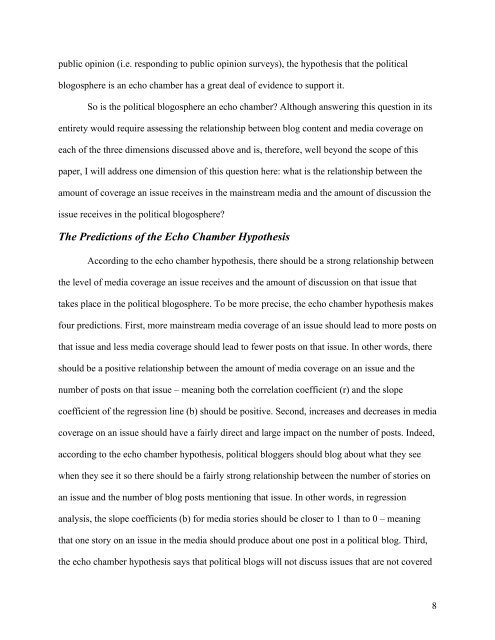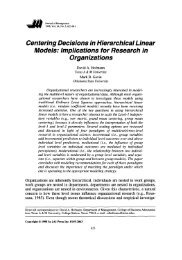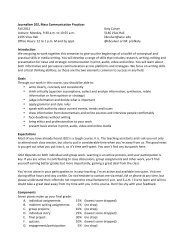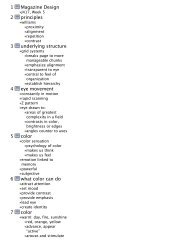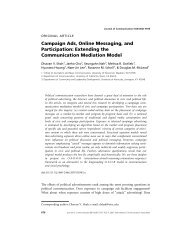Political Blogs and the Bloggers Who Blog Them - School of ...
Political Blogs and the Bloggers Who Blog Them - School of ...
Political Blogs and the Bloggers Who Blog Them - School of ...
Create successful ePaper yourself
Turn your PDF publications into a flip-book with our unique Google optimized e-Paper software.
public opinion (i.e. responding to public opinion surveys), <strong>the</strong> hypo<strong>the</strong>sis that <strong>the</strong> political<br />
blogosphere is an echo chamber has a great deal <strong>of</strong> evidence to support it.<br />
So is <strong>the</strong> political blogosphere an echo chamber? Although answering this question in its<br />
entirety would require assessing <strong>the</strong> relationship between blog content <strong>and</strong> media coverage on<br />
each <strong>of</strong> <strong>the</strong> three dimensions discussed above <strong>and</strong> is, <strong>the</strong>refore, well beyond <strong>the</strong> scope <strong>of</strong> this<br />
paper, I will address one dimension <strong>of</strong> this question here: what is <strong>the</strong> relationship between <strong>the</strong><br />
amount <strong>of</strong> coverage an issue receives in <strong>the</strong> mainstream media <strong>and</strong> <strong>the</strong> amount <strong>of</strong> discussion <strong>the</strong><br />
issue receives in <strong>the</strong> political blogosphere?<br />
The Predictions <strong>of</strong> <strong>the</strong> Echo Chamber Hypo<strong>the</strong>sis<br />
According to <strong>the</strong> echo chamber hypo<strong>the</strong>sis, <strong>the</strong>re should be a strong relationship between<br />
<strong>the</strong> level <strong>of</strong> media coverage an issue receives <strong>and</strong> <strong>the</strong> amount <strong>of</strong> discussion on that issue that<br />
takes place in <strong>the</strong> political blogosphere. To be more precise, <strong>the</strong> echo chamber hypo<strong>the</strong>sis makes<br />
four predictions. First, more mainstream media coverage <strong>of</strong> an issue should lead to more posts on<br />
that issue <strong>and</strong> less media coverage should lead to fewer posts on that issue. In o<strong>the</strong>r words, <strong>the</strong>re<br />
should be a positive relationship between <strong>the</strong> amount <strong>of</strong> media coverage on an issue <strong>and</strong> <strong>the</strong><br />
number <strong>of</strong> posts on that issue – meaning both <strong>the</strong> correlation coefficient (r) <strong>and</strong> <strong>the</strong> slope<br />
coefficient <strong>of</strong> <strong>the</strong> regression line (b) should be positive. Second, increases <strong>and</strong> decreases in media<br />
coverage on an issue should have a fairly direct <strong>and</strong> large impact on <strong>the</strong> number <strong>of</strong> posts. Indeed,<br />
according to <strong>the</strong> echo chamber hypo<strong>the</strong>sis, political bloggers should blog about what <strong>the</strong>y see<br />
when <strong>the</strong>y see it so <strong>the</strong>re should be a fairly strong relationship between <strong>the</strong> number <strong>of</strong> stories on<br />
an issue <strong>and</strong> <strong>the</strong> number <strong>of</strong> blog posts mentioning that issue. In o<strong>the</strong>r words, in regression<br />
analysis, <strong>the</strong> slope coefficients (b) for media stories should be closer to 1 than to 0 – meaning<br />
that one story on an issue in <strong>the</strong> media should produce about one post in a political blog. Third,<br />
<strong>the</strong> echo chamber hypo<strong>the</strong>sis says that political blogs will not discuss issues that are not covered<br />
8


